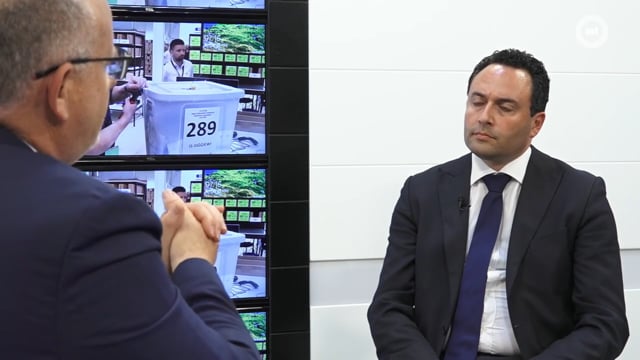[WATCH] Nationalist MP David Stellini resigns, paving the way for co-option of new MP
‘I don’t like Maltese partisanship’ says Nationalist MP whose seat could open new rift for PN factions


The Nationalist MP David Stellini has officially resigned his seat in the House of Representatives, to return to his posting with the European People’s Party in Brussels.
In an interview with MaltaToday, the Gozitan MP, who ran for MEP, expressed his dismay at the excessive partisanship of Maltese politics.
“I came from Brussels to Malta in a bid to work for a politics of unity, that can give people results. But there is a group of people who want the politics of the arena... a battle between gladiators,” he said.
“I call it the politics of symbiosis, because the large gladiator needs to have a smaller gladiator to fight against, and the smaller gladiator needs to pick a fight with the large opponent to keep its fans alive: the PN must be careful not to fall into this battle because it will not win it,” Stellini said. “The Maltese system is not conducive to the politics of unity I embrace.”
Stellini has previously said that his salary as an MP, which is a ‘part-time’ occupation in Malta, was insubstantial and that employers were either unwilling to take on an MP, or wanted an MP to do their bidding.
“I don’t like partisanship. Life as a part-time MP is hard: employers who do not want to be associated with politics will not employ MPs. Indeed, they told me they do not want to be tarnished by politics, something which to me is a noble pursuit.
Stellini said he had informed Opposition leader Adrian Delia and the Speaker of the House in writing of his resignation.
Stellini was elected to Parliament for the first time in the casual election on the 13th district for the seat vacated by Nationalist MP Marthese Portelli, who was elected on two districts.
Given that Stellini was elected by a casual election, his resignation from the House will prompt a co-option, allowing the PN to select any person to be installed as an MP.
His decision has already sparked approaches from both factions within the PN to only leave when the time is ripe for the co-option of their choice.
One faction which is loosely led by Beppe Fenech Adami and former PN leader Simon Busuttil, have suggested that he leaves when Nationalist MEP Roberta Metsola might be in a position to return to Malta – ostensibly, Metsola is touted as an alternative to the PN’s beleaguered party chief Adrian Delia.
On the other side of the PN political spectrum, the Delia faction wants Stellini to leave at a more appropriate time to allow them to co-opt Jean Pierre Debono, who was also elected to the House for the first time in 2017, but relinquished his parliamentary seat to force a casual election – filled by an MP who resigned immediately – so that Adrian Delia could enter the House as Opposition leader.
Debono is the husband of MP Kristy Debono and is employed in the PN administration, and naturally a staunch ally of Adrian Delia.
Stellini however said he will not be resigning his post as president on the PN’s administrative council, saying he will await the outcome of the forthcoming local council elections, which are set to deliver yet another blow to PN leader Adrian Delia.
“I will continue occupying this position in the future. So I will continue contributing to the PN.
“If activists wish that I resign from the PN administrative council, then I should follow suit... I think it is premature at this point, but we are days away from another electoral result.
“I think a lot of people in 2017 said that Simon Busuttil had left the party leadership too hastily. So it is possible that such an immediate change is not always the best solution,” he said with respect to calls for Delia’s resignation. “That is why the party has to analyse the electoral result.”
Stellini also said the PN will have to endure yet more shifts in factional loyalties, as activists attempt to shore up support for Delia, or push for a new leader who can bridge the internal divide.
“Factionalism inside the PN has always been part of its history. After this election, factional loyalties will be shifting once again. It is possible that the majority of PN activists who are pleased at Roberta Metsola’s and David Casa’s election in the European Parliament, but also at retaining Adrian Delia as PN leader, because they see a balance between both factions.”
Stelllini said however that the PN has to analyse the result and that political responsibility had to be shouldered. “Humility in politics demands this. These two electoral results have to be compared with previous results, not with survey forecasts.”






.jpg)















